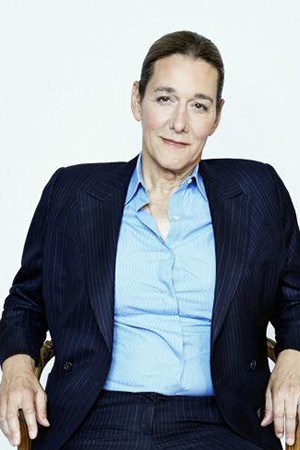When sharing the room with Martine Rothblatt, there's a bounty of mind-reeling topics to explore. Like how she pulled off sending solar panels the length of 60-story buildings into space, to create Sirius Satellite Radio. Or what it was like to declare herself openly transgender decades before Caitlyn Jenner. Or how she turned a personal mission to save her daughter's life into a billion-dollar pharmaceutical company.

Image caption: Martine Rothblatt
And don't forget digital immortality. That's the focus of Rothblatt's 2015 book, Virtually Human: The Promise—and the Peril—of Digital Immortality, which expounds on the heady concept that our consciousness may be able to live on infinitely in the digital realm after our bodies expire.
Rothblatt touched on all of these topics Wednesday night while visiting Johns Hopkins University as part of the MSE Symposium lecture series.
Moderator Christy Wyskiel, senior adviser for enterprise development to JHU President Ronald J. Daniels, introduced the evening as a chance "to really dig in and understand the mindset of a successful entrepreneur."
Rothblatt ranks among the top-earning female CEOs in the America—in 2013, she found herself at the very top of that list—after founding GeoStar, the GPS-based navigation system, in the 1980s; then Sirius in 1990; and later the biotech company United Therapeutics.
In the midst of all that, she transitioned from male (she was born Martin) to female, penning The Apartheid of Sex in 1995 to argue for a more prismatic model for gender identity.
If she'd had to go through the transition at an earlier time in history, Rothblatt said last night, "I probably would have been beaten or killed." But in her own experience, she said, "my family was fully supportive, my business colleagues were fully supportive."
Speaking of her work with Sirius, Rothblatt recounted an incident at the U.S./Canadian border, where a patrol officer learned who she was—then requested a hug. Living in the isolated area, the officer explained: "If it weren't for Howard Stern, I would go batsh*t crazy."
While she was running that company, Rothblatt and her family got a devastating blow: Her daughter Jenesis was diagnosed with a rare and life-threatening disease, pulmonary arterial hypertension. There was no cure.
Rothblatt wouldn't accept that as final word. Burying herself in medical literature, she discovered a specific molecule that might be able to help. Pharmaceutical giant GlaxoSmithKline owned the drug, but wouldn't develop it, Rothblatt said, because it wasn't economically viable.
So in 1996 she created her own pharmaceutical company. "I cashed in my stock at Sirius and formed United Therapeutics," she said. She hired experts, persuaded Glaxo to sell them the medicine, and secured FDA approval for it.
"Today that medicine generates over $1 billion in sales," she said. "Jenesis is now 30 years old and works at our company."
Addressing her theories on artificial intelligence, Rothblatt credited the influence of fellow futurist Ray Kurzweil, director of engineering at Google. His 1999 book, The Age of Spiritual Machines, "really blew my mind," Rothblatt said, convincing her that computers would one day—in the not-so-distant future—equal the processing capability of humans and therefore develop traits like spirituality.
Rothblatt's own explorations have focused on the notion of the "mindclone"—a digital replica of an individual's consciousness created by videos, photographs, transcripts, and the entirety of their online existence—through social media, emails, Amazon orders, and so forth. When the body dies, she postulates, the non-human mindclone will continue to exist in the digital world.
"A mindclone is created from the thoughts, recollections, feelings, beliefs, attitudes, preferences, and values you have put into it," she writes in Virtually Human, which draws on her background in law to explore the legal and ethical implications of this concept.
Wyskiel remarked on the potential for generations of family members to interact this way over time. "The concept that [we] wouldn't be lost would be magical," she said.
Rothblatt agreed: "Every time a person dies, it's like you're burning a library," she said. "Why can't that be available to your grandchildren, or your great great grandchildren?"
Rothblatt was the fourth guest this year for JHU's Milton. S Eisenhower Symposium, a student-run lecture series established in 1967. Next up is U.S. Sen. Bernie Sanders. on Nov. 17.
Posted in Voices+Opinion, Politics+Society
Tagged diversity, mse symposium, entrepreneurship







